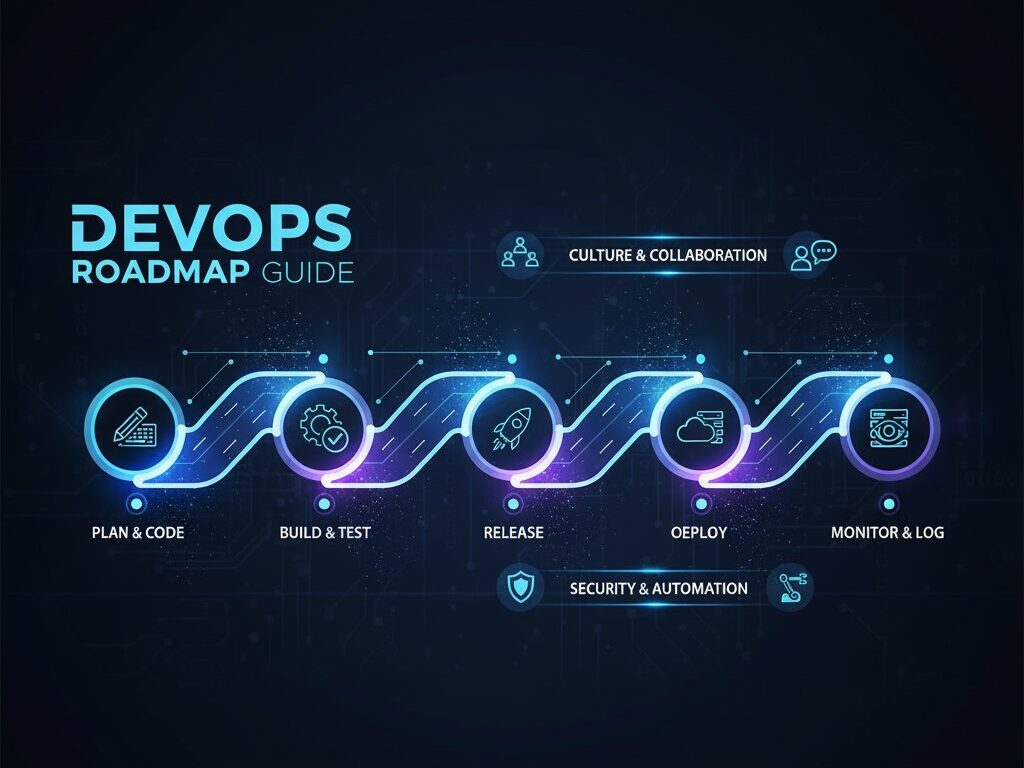Student Blog
The blog is posted by WeCloudData’s student Sneha Mehrin. Overview on how to ingest stack overflow data using Kinesis…
by Student WeCloudData
October 28, 2020
Blog
If you’ve been exploring career paths in technology, you’ve probably asked yourself: What is DevOps? Simply put, DevOps is a set of practices, tools, and a cultural philosophy that brings together software development (Dev) and IT operations (Ops). The goal is to shorten the software development lifecycle, deliver features faster, and improve reliability.
For newcomers, a DevOps roadmap for beginners can feel overwhelming. There are dozens of tools, multiple cloud providers, and buzzwords everywhere. But don’t worry this devops transformation roadmap guide breaks it down step by step. You’ll see the technical skills required for a DevOps engineer, the tools you need to learn, and how to practice without a computer science degree.
Along the way, we’ll answer common beginner questions like Is DevOps very difficult?, Is 3 months enough for DevOps?, and even Is DevOps replaced by AI?
So, what is the roadmap of DevOps? Think of it as building blocks stacked on top of each other. You can’t run before you learn to walk, and DevOps is no different.

Start with the basics:
The modern DevOps world runs on containers and cloud:
Manual work doesn’t scale. DevOps engineers automate everything:
Continuous Integration and Continuous Deployment (CI/CD) form the heart of devops transformation roadmap. Here’s where theory meets practice:
This is where many beginners get stuck in the devops transformation roadmap. Reading about tools isn’t enough. You need to practice for materials to stick. Some ways to do that are by doing Mini Projects: Build a pipeline for a simple app, deploy it on AWS, and monitor it. Labs: Use free tiers on AWS or GCP, or platforms like Katacoda.
Projects help you in applying theoretical concepts you have learned and showcase to potential employers that you know what you are doing. Projects a plus point to any resume for a DevOps job application.
If you are still confused about where to kickstart your journey… let us help you in taking your first step with WeCloudData’s DevOps Engineer Track. This track provides an in-depth foundation in DevOps, covering essential tools, processes, and practices across the development lifecycle. You’ll gain hands-on experience in Linux, containerization, cloud computing, CI/CD, and monitoring, preparing you to build, test, and deploy high-quality software at scale. You’ll work with tools like Kubernetes, GitOps, and DevSecOps.
The WeCloudData DevOps course is a full track that combines projects, mentorship, and labs. It’s a solid option if you want a guided DevOps learning with resources that keep you accountable. Stay tuned for more updates with WCD!
What is DevOps?
DevOps is the practice of combining software development and IT operations to deliver faster, more reliable applications.
Is DevOps very difficult?
No. It looks complex at first, but with consistent practice and the right roadmap, it becomes manageable.
Is 3 months enough for DevOps?
Three months is enough to cover basics, but most people need 6–12 months of practice to be job-ready.
Does DevOps require coding?
Yes, but only basic scripting, usually Python or Bash.
How to become a DevOps engineer without degree?
Focus on hands-on skills, projects, and certifications. Many employers value skills over degrees.
"*" indicates required fields

WeCloudData is the leading data science and AI academy. Our blended learning courses have helped thousands of learners and many enterprises make successful leaps in their data journeys.
"*" indicates required fields
Canada:
180 Bloor St W #1003
Toronto, ON, Canada M5S 2V6
US:
16192 Coastal Hwy
Lewes, DE 19958, USA